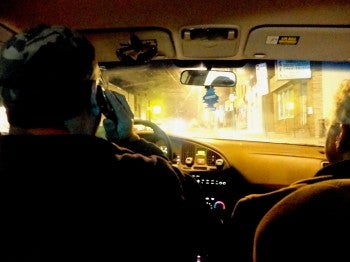Frankford Avenue prostitution a problem for many neighborhoods

Fourteen years ago, Joe Nicoletti made the decision to come back to his roots in Tacony where family settled in the 1890s from Italy. Nicoletti wanted to start a family with his wife and grow old together.
“Someone told me the neighborhood isn’t what it used to be so I decided to get involved,” Nicoletti said. “You’d be surprised what you don’t know is happening in your neighborhood after one in the morning.”
On a recent Friday evening, Nicoletti and five other citizens met in a designated parking lot along Frankford Avenue. The Tacony Town Watch members discussed their concern over the recent racially driven graffiti on the Tacony Train Station before dividing themselves into three teams of two and setting off in their cars to their respective patrol areas.
“The Northeast is being plagued with a hodgepodge of issues, and that includes narcotics and prostitution,” Nicoletti said.
Shortly after 11:30 pm, he drove down Frankford Avenue and pulled to the side of the road after he spotted what the watch refers to as a “pro.”
He asked his partner for the night, a woman who chooses to remain anonymous for fear of reprisals, to take down the woman’s description.
“She’s a Hispanic female in her 20s,” Nicoletti said. “I’d say about 5’4,” shoulder length brown hair with light brown highlights wearing a black jacket with a white hoodie and black pants, holding a black handbag.”
The woman saw Nicoletti’s car and walked into a nearby pizza shop. Nicoletti said that the women they see on a regular basis recognize his car. He decided to go around the block and in that time another town watch vehicle saw the woman enter a vehicle that pulled up alongside her.
The call is made to report the incident to the Philadelphia Police Department. It goes to the 8th District because the town watch patrols throughout the area and into Upper Holmesburg.
“To say we have a prostitution epidemic is simply not true,” Stan Cywinski, the president of the Upper Holmesburg Civic Association said. “If there’s an issue, you address it by documenting the issue and providing evidence of where the issue is happening, when and who you think is doing it. And then I take that information and give it to the police department.”
Cywinski said the 8th District is well aware of the issue.
“There has been an increasing prostitution problem in the area and the city vice unit has been out there for the last couple weeks addressing the issue and numerous arrests have been made,” said Lt. John Stanford, a Philadelphia Police Department public affairs officer. “It’s an ongoing issue and battle and the department will continue to address it.”
Barbara Rup, a member of the Tacony Town Watch and chairperson of the Northeast Quality of Life Coalition, said she believes the increase in police activity has been beneficial but it’s hard to keep the women from going back to the streets.
“When they get caught on one street they move onto another street,” said Rup. “They need the money to support their drug problem, so it’s a process.”
Prosecuting prostitution is a challenge, according to Tasha Jamerson, a spokeswoman for the Philadelphia District Attorney.
“You don’t just have prostitution. A lot of times you have drug problems and abuse problems,” Jamerson said. “We try to get them into the Dawn Court where we can get them away from their pimp and help them turn their lives around.”
Related coverage
Philadelphia’s Project Dawn Court, a diversion court for women that have more than three convictions for prostitution, is 2 years old.
“As a team we want to holistically look at why these women are prostituting and deal with their sexual trauma issues and drug abuse issues,” Assistant District Attorney Shea Rhodes said. “More times than not, drug abuse came after the sexual trauma as a way to disassociate themselves with the pain they suffered.”
Rhodes said she receives phone calls every day from assistant attorneys and the police to request for her to look at a woman’s file to see if she is a good candidate to join the program. Rhodes then reviews her record to make sure she doesn’t have a violent criminal history and if she doesn’t, Rhodes will make a referral to Project Dawn Court.
“The woman will then sit down with the court coordinator and with her lawyer and is then offered the opportunity to join the program,” Rhodes said. “If she has probation cases, generally those cases are relinquished by the judge and if the woman successfully completes the program, any former cases against her may be expunged if she doesn’t commit any new crimes.”
Nicoletti said he believes that the low-rent apartments along Frankford Avenue attribute to the problem.
“Until we have a firm grip on the rental problem in lower Northeast Philadelphia, this isn’t going to stop,” he said. “Tenants do not receive background checks and that leads to bad company.”
Jessica Lopez is a student reporting for Philadelphia Neighborhoods, the publication of Temple University’s Multimedia Urban Reporting Lab.
WHYY is your source for fact-based, in-depth journalism and information. As a nonprofit organization, we rely on financial support from readers like you. Please give today.



